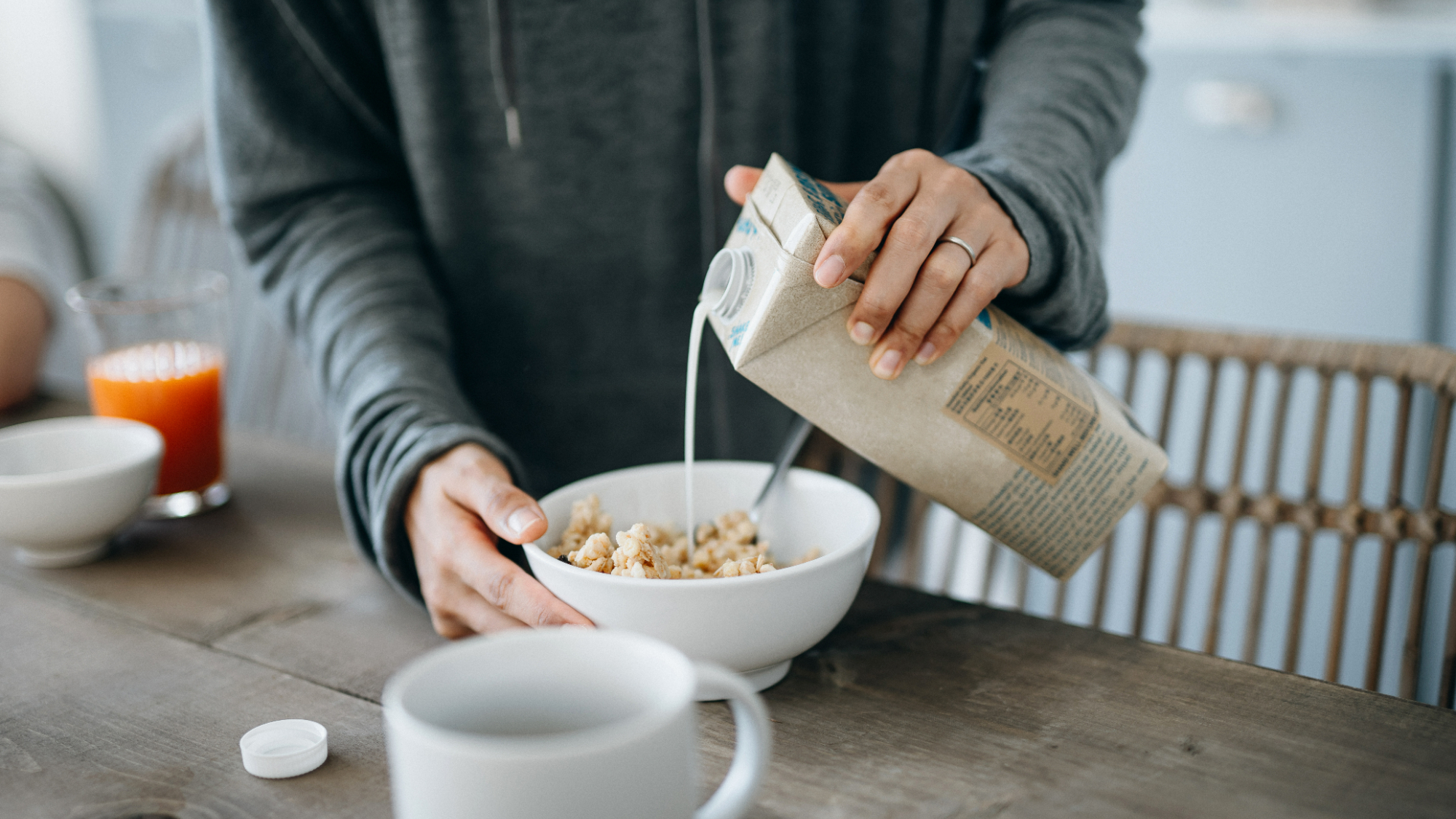Is oat milk good for you?
It's tasty and works well in coffee, but is oat milk good for you?

Get the world’s most fascinating discoveries delivered straight to your inbox.
You are now subscribed
Your newsletter sign-up was successful
Want to add more newsletters?
Join the club
Get full access to premium articles, exclusive features and a growing list of member rewards.
Oat milk is one of the most popular dairy milk alternatives, with plenty of people ditching cow's milk in favor of oat milk in their coffee, breakfast cereal, or as a drink on its own. But is oat milk good for you and should you really be drinking it? As ever, the answer is that oat milk can be good for you overall, but isn't always better than cow's milk in a number of circumstances. And it the benefit of your oat milk can depend on the brand.
Cow's milk is a well-established part of our diet, with the researchers at the University of York discovering evidence that humans have been consuming it for at least 6,000 years. The milk's nutritional content depends on the animal's diet and naturally contains many vitamins and other nutrients.
Related: Is milk good for your teeth?
The composition of cow's milk might differ slightly across manufacturers, but oat milk nutrition can vary between brands, with some companies even releasing several versions of their oat milk, like the barista-style editions designed to foam well for coffees.
But the core ingredients are the same; oats and water. There are plenty of health benefits to eating oats and drinking water, but the two combined don't naturally have as many vitamins, minerals, and other nutrients your body needs as cow's milk, so they are often added.
"Oat milk may be fortified with calcium and Vitamin D, as well as Vitamin B12, which are normally present in dairy milk varieties, and are important for bone health and nerve and cell health, respectively," Sarah Schlichter, a registered dietitian at Bucket List Tummy told Live Science.
"[It's also] void of saturated fat, so it can be a good option for those with heart disease or at a high risk of heart health issues." And, as Schlichter noted, there is some fiber in oat milk, which can go some way to hitting your daily targets.
Get the world’s most fascinating discoveries delivered straight to your inbox.

Sarah is a registered dietitian and the founder of Bucket List Tummy. She holds a Master's in public health and is currently working towards accreditation as a Board Certified Specialist in Sports Dietetics (CSSD). Rather than focusing on restrictive diets, Sarah helps her clients repair their relationship with food, to help them improve their performance and wellbeing and she enjoys creating easy-to-approach recipes for busy families and athletes.
Oats contain a specific type of fiber known as oat beta-glucan (ꞵ-glucans) and these have a particular effect on your digestion. The beta-glucans interact with the chemicals in your digestive system, and can lead to delayed gastric emptying.
This helps reduce the amount of sugar in your blood after eating, and can lead to improved insulin sensitivity. According to a study published in the European Journal of Clinical Nutrition, oat beta-glucans had a “meaningful reduction in postprandial glucose responses” for diabetics and non-diabetics.

Some brands add sugar to make the drink a little sweeter, impacting your other fitness goals. According to weight loss coach Joe Johnson of 9-5 Nutrition, "skimmed cow's milk will generally be lower in calories than oat milk, so if weight loss is your main goal, then sticking with animal milk could be your best bet."
Though, Johnson didn’t rule out oat milk altogether, as he explained that "it really depends why you're drinking oat milk; if you're lactose intolerant and suffer discomfort or bloating after drinking animal milk, then absolutely; drinking oat milk is going to be good for you."

Joe is a qualified YMCA Level 2 Fitness Instructor and online weight loss coach, specializing in helping office workers make sustainable and long-lasting changes. He works with his clients to develop personalized exercise and nutritional plans to help them achieve their weight loss targets without restrictive diets.
But it can be tricky to know for sure what's actually in your plant-based milk. Manufacturers have to list certain nutritional information on the label, but some essential minerals don't always have to be added.
Research conducted by the Food and Drug Administration (FDA) and presented at the American Chemical Society Fall Meeting 2022 found that many plant-based milks had lower amounts of phosphorus, magnesium, zinc and selenium.
This is one of the reasons that vegans should take supplements to top up their levels of essential nutrients commonly found in animal products. However, there's a more significant difference between dairy milk and oat milk — protein.
Cow's milk is an excellent source of protein on its own, and whey — a byproduct of milk and cheese production — is generally considered one of the highest-quality sources of protein, which is why it's found in most of the best protein powders.
This isn't necessarily a problem, as you can use the best vegan sources of protein to help compensate for the lower levels often found in oat milk. Still, it is another factor to consider when you weigh up if oat milk is good for you.
It's not only vegans making the switch to oat milk, as it's an ideal choice for those with lactose intolerance. Plus, a study published in the American Association for the Advancement of Science found that oat milk production has some of the lowest emissions and water use among milks.
So, while you might need to spend a bit of time researching specific brands to find one that suits your dietary needs, oat milk (in moderation) can be good for you and better for the planet. If it's not right for you, try some of the other best milk alternatives instead.
Originally published on Live Science.
James is a Staff Writer for Live Science's sister site, Fit&Well. Before joining Future in 2021, he was the Buyer's Guide Editor and a Senior Staff Writer for the consumer technology website MakeUseOf and has bylines at Blocks Decoded, Lifewire, and Happiness.
He regularly tests out fitness equipment, including smartwatches, headphones, and writes about affordable ways to improve your health and wellbeing. James studied Mechanical Engineering at the University of Surrey, which is where he learned about the fundamentals of thermodynamics, fluid mechanics, and material design.
 Live Science Plus
Live Science Plus












